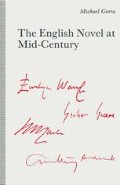Abstract
Henry Green’s early novels Living (1929) and Party Going (1939) stand as the most ambitious fiction any writer of his generation produced before the Second World War. None of his contemporaries had Green’s ability to describe the social forces that separate class from class. None of them had such a fine ear for both dialogue and dialect. None had the breadth of imaginative sympathy that enabled him to capture what his friend and best critic V. S. Pritchett calls ‘the inner language and landscape’ in which people ‘lead their real lives’.1 In the first half of his career Green used that sympathy primarily in an attempt to understand the lives of men and women from classes other than his own. Living was not only the first book in which any member of his class and generation tried to imagine the lives of the English working class, but the best — the novel in which the working-class characters are the least conventionalized, the most highly individualized. It is the first attempt any of the writers I am concerned with made at a totalizing picture of the way their society moved.
Access this chapter
Tax calculation will be finalised at checkout
Purchases are for personal use only
Preview
Unable to display preview. Download preview PDF.
Notes and References
V. S. Pritchett, ‘Henry Green: In the Echo Chamber’, in The Tale Bearers (New York: Random House, 1980), p. 115.
Philip Toynbee, ‘The Novels of Henry Green’, The Partisan Review, 16 (1949), p. 587.
Anthony Powell, Infants of the Spring (New York: Holt, Rinehart & Winston, 1977), p. 161.
Harvey Breit, ‘A Talk with Henry Green - and a P.S.’ The New York Times Book Review, 19 February 1950, p. 29.
Henry Green, ‘Apologia’, Folios of New Writing, Autumn 1941 (London: The Hogarth Press), p. 46.
Nigel Dennis, ‘The Double Life of Henry Green’, Life 33 (August 4, 1952), p. 84.
Terry Southern, ‘Henry Green’, The Paris Review 5, no. 19 (1958), p. 73.
Henry Green, ‘A Novelist to His Readers’, The Listener, 9 November 1980, p. 506.
Frank Kermode, The Art of Telling (Cambridge, MA: Harvard University Press, 1983), p. 89.
Michael North, Henry Green and the Writing of His Generation (Charlottesville: University Press of Virginia, 1984), p. 15.
Valentine Cunningham, British Writers of the Thirties (Oxford: Oxford University Press, 1988), pp. 9–10.
Walter Allen, ‘An Artist of the Thirties’, Folios of New Writing 3 Spring 1941, p. 149.
Evelyn Waugh, ‘A Neglected Masterpiece’. The Essays, Articles, and Reviews of Evelyn Waugh, ed. Donat Gallagher. (Boston: Little, Brown & Co., 1984), p. 81.
W. H. Auden, ‘In Memory of W. B. Yeats’, in The English Auden, ed. Edward Mendelson (New York: Random House, 1977), p. 242.
G. Rostrevor Hamilton, The Tell-Tale Article (London: Heinemann, 1949), p. 8.
A. Kingsley Weatherhead, A Reading of Henry Green (Seattle: University of Washington Press, 1961), p. 88.
Henry Green, ‘For Jenny with Affection from Henry Green’, The Spectator 211 (4 October 1963), p. 422.
T. S. Eliot, ‘The Love Song of J. Alfred Prufrock’, The Complete Poems and Plays, 1909–1950 (New York: Harcourt Brace and World, 1952), p. 6.
Giorgio Melchiori, The Tightrope Walkers: Studies of Mannerism in Modern English Literature (London: Routledge & Kegan Paul, 1956), p. 189.
Terry Southern, ‘Henry Green’, The Paris Review 5, no. 19 (1958), p. 66.
John Russell, ‘There It Is’, Kenyon Review, 16 (1964), p. 451.
Eudora Welty, ‘Henry Green: A Novelist of the Imagination’, Texas Quarterly 4 (1961), p. 249.
Samuel Beckett, The Unnameable (1958), in Three Novels by Samuel Beckett (New York: Grove Press, 1965), p. 414.
John Updike, ‘Introduction’ to Loving, Living, Party Going (Harmondsworth: Penguin Books, 1978), p. 14.
V. S. Pritchett, ‘A Literary Letter from the British Capitol’, The New York Times Book Review, 7 January 1951, p. 14.
Norman Page, Speech in the English Novel (London: Longman, 1973), p. 130.
Terry Southern, ‘Henry Green’ The Paris Review 5, no. 19 (1958), p. 67.
Evelyn Waugh, The Letters of Evelyn Waugh, ed. Mark Amory (New Haven and New York: Ticknor & Fields, 1980), p. 516.
Author information
Authors and Affiliations
Copyright information
© 1990 Michael Gorra
About this chapter
Cite this chapter
Gorra, M. (1990). Henry Green (1905–1973). In: The English Novel at Mid-Century. Palgrave Macmillan, London. https://doi.org/10.1007/978-1-349-11457-3_2
Download citation
DOI: https://doi.org/10.1007/978-1-349-11457-3_2
Publisher Name: Palgrave Macmillan, London
Print ISBN: 978-1-349-11459-7
Online ISBN: 978-1-349-11457-3
eBook Packages: Palgrave Literature & Performing Arts CollectionLiterature, Cultural and Media Studies (R0)

